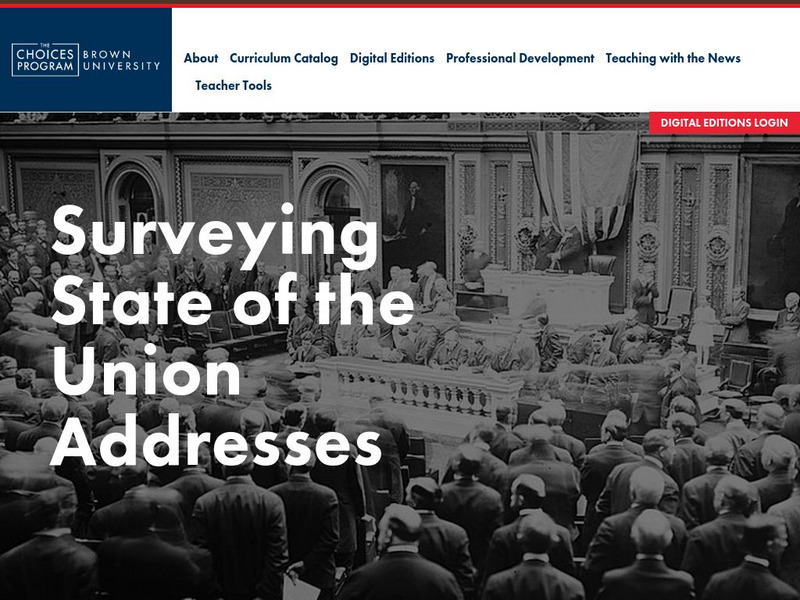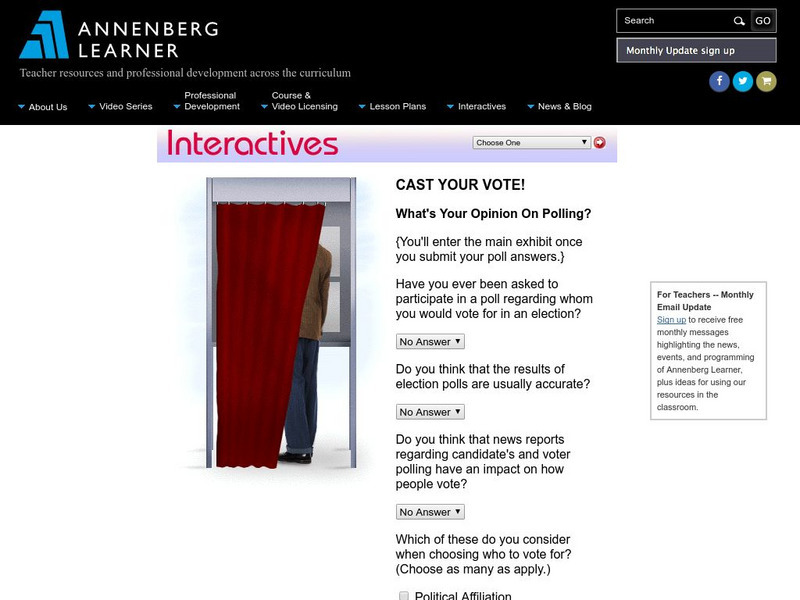Curated OER
Welcome to the Blogosphere
Create a blog spot for your classroom and promote online discussions. There are several blogging websites listed here, and you can create one specific to each class or one collective site. Teach your learners how to post on the blog, and...
Discovery Education
Sonar & Echolocation
A well-designed, comprehensive, and attractive slide show supports direct instruction on how sonar and echolocation work. Contained within the slides are links to interactive websites and instructions for using apps on a mobile device to...
Curated OER
Scapegoating and Othering
Scapegoating and "Othering" is the focus of a series of activities that ask groups to consider how these behaviors contribute to hatred and intolerance. Groups are given a scenario and discussion questions based on the situation. Whether...
Curated OER
English Literature: An Overview
Relate literary works and authors to the major themes of English literature from the Anglo-Saxon period through the 20th century. Working in groups, high schoolers will evaluate period philosophy, religion, and politics that influenced...
Curated OER
Let's Put You in a Louisiana University
Considering a college search project? After picking a possible career choice, and determining if that career needs a technical college or university education, individuals examine a wide variety of sources and select three schools...
Curated OER
Exploring Louisiana's Land Down Under - The World of Kate Chopin's The Awakening.
Visit 19th century Grand Isle, Cheniere Caminada, and New Orleans! Meet the inhabitants, learn about their history and culture, and view landmarks and industries! After reading Kate Chopin’s The Awakening, class groups research the...
Google
Beginner 4: Searching for Evidence for Research Tasks
Having a strong searching skill set can make a research project much easier and much for successful for pupils. Tackle finding evidence with the ideas included here. The ultimate goal is for class members to learn the stepping stones...
EngageNY
Summarizing Bivariate Categorical Data
How do you summarize data that cannot be averaged? Using an exploratory method, learners complete a two-way frequency table on super powers. The subject matter builds upon 8th grade knowledge of two-way tables.
Google
Advanced 4: Searching for Evidence for Research Tasks
Research was very different in the past. Pupils once had difficulty finding sufficient information, but now they have the opposite problem. Show your class how to pick the best resources out of the millions of sites an online search will...
EduGAINs
Go H2O! Investigating Residential Water Systems
Before your learners excuse themselves to get a drink at the water fountain, prompt them to think about where that water comes from. A middle school science lesson encourages groups to research their community's source of drinking water,...
Curated OER
Synthesis of Information
Locating and synthesizing information is an essential part of the research process but can be overwhelming for many young writers. Eliminate some of the stress and confusion, this resource suggests, by separating these steps. To focus...
Curated OER
Taking a Stand on Bullying
Middle schoolers stand up against bullying in a character-building lesson. After discussing historical figures who became advocates in times of adversity, they brainstorm ways to end bullying at their own school, and use a formal letter...
PBS
Pbs Learning Media: Earth's Systems: The Water Planet
Observe different forms of water and how it covers about 75 percent of Earth's surface in this media gallery captured by NASA and the U.S. Geological Survey (USGS). Use the satellite and ground images in this resource to enhance student...
Choices Program, Brown University
Choices: Teaching With the News: Surveying State of the Union Addresses
Learning module with multi-media resources helps students understand the constitutional basis and history of the State of the Union Address, identifying important historic themes and significant topics. Includes video, graphic...
Choices Program, Brown University
Choices: Teaching With the News: Protests, Revolutions, and Democratic Change
Third in a series of lessons on North Africa and the Middle East in which students survey the current political situation, consider the role of the international community and identify the political geography of the region. Multi-media...
Annenberg Foundation
Annenberg Learner: Five Question Survey: Basic Astronomy?
Find out your or your students' understanding of astronomy. To be used as a pre-assessment, your students can compare what they already know.
Annenberg Foundation
Annenberg Learner: 5 Question Survey: Heat and Temperature
Find out your or your students' understanding of heat and temperature. Afterwards you can see how others answered the questions.
Annenberg Foundation
Annenberg Learner: 5 Question Survey: Density and Pressure
Find out your or your students' understanding of density and pressure. Afterwards you can see how others answered the questions.
Annenberg Foundation
Annenberg Learner: 5 Question Survey: Rising and Sinking
Find out your or your students' understanding of fluid displacement. Afterwards you can see how others answered the questions.
Annenberg Foundation
Annenberg Learner: 4 Question Survey: Matter
Find out your or your students' understanding of matter. Afterwards you can see how others answered the questions.
Annenberg Foundation
Annenberg Learner: 5 Question Survey: Chemical Change
Find out your or your students' basic knowledge of concepts like matter, molecules and open and closed systems. Afterwards you can see how others answered the questions.
Annenberg Foundation
Annenberg Learner: 5 Question Survey: Reviewing the Previous Sessions
Find out your or your students' understanding of matter. Afterwards you can see how others answered the questions.
Annenberg Foundation
Annenberg Learner: Interactives: Cast Your Vote!
Upper elementary, middle, and high school students can use this exhibit to get an understanding of how polls and elections are conducted. The discussion includes random samples, margins of error, and other concepts related to statistics.
Other
Brookfield High School: Lesnansky's Control Center: Would You Rather? (Part 2)
In this activity, students will create a customized Google Form that will showcase the four dilemmas defined by the game cards from Would You Rather...? and then share the form with others to collect data for analysis. Lots of Would You...























